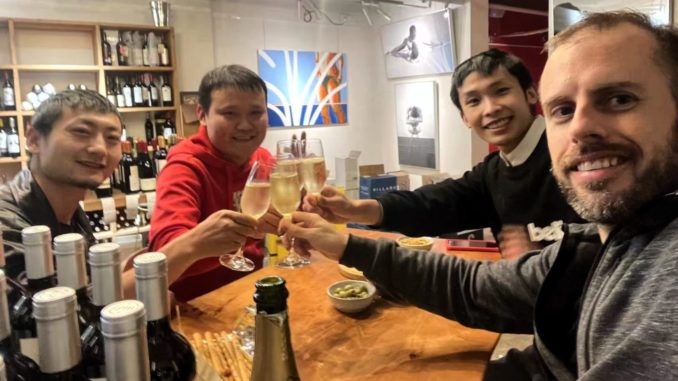
“I took my pillow, blanket and air fryer, and moved into my [Shanghai] wine shop for almost two months… I also made a deal with three delivery guys living in the streets to stay with me in the shop.”
— Mariano Larrain Hurtado of La Cava de Laoma
The two-month city-wide COVID policy-induced lockdown of Shanghai last year was a particularly trying period. Most people were holed up at home, save for trips for COVID tests, and managing food and drink supplies while trying to maintain sanity. That goes for many people in the wine trade, given that Shanghai is China’s leading city for this beverage.
But not all stories are the same. And Mariano Larrain Hurtado, a Chilean wine importer who also has two Shanghai shops that stock wines from a dozen nations, has one of the more interesting. Two weeks into the lockdown, he abandoned his apartment and moved into his wine shop La Cava de Laoma, sharing it with three delivery drivers that had been strangers to him two days before. This is his story.
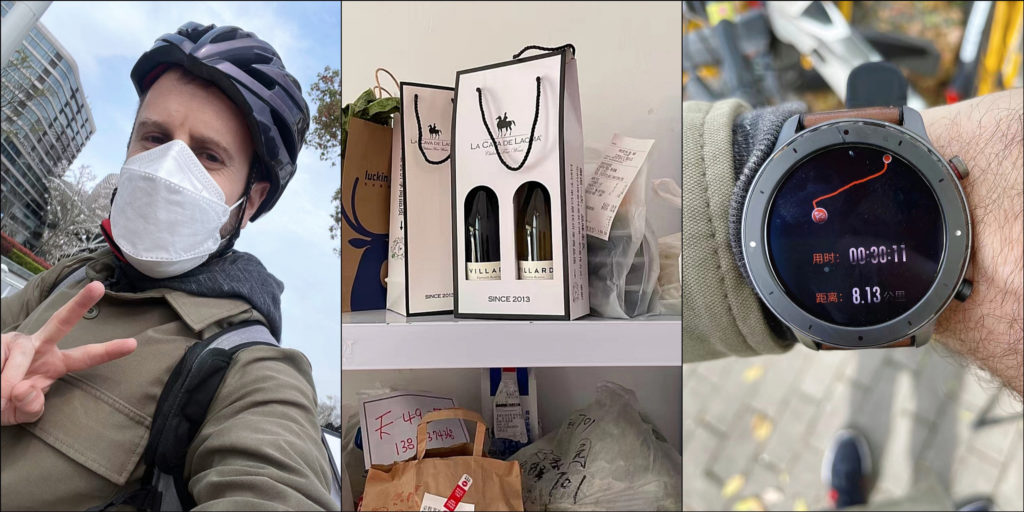
Home Alone
Like almost everyone in Shanghai, Larrain found himself stuck at home as April began. And making things worse, he was so preoccupied with filling deliveries by bicycle during the last days of March, that he didn’t stock up on food.
“The government told us the lockdown was going to be five days, so we didn’t really prepare,” he says.
“My shop manager Xiao Liang and I were working until the last minute before that long lockdown.”
Larrain got creative by combining the food he did have with the tomatoes, onions, potatoes and eggs delivered by the authorities.

He also helped to source food for Liang, who was locked down elsewhere in Shanghai.
“He didn’t have any food and it was hard to find anyone doing deliveries. We managed to find one guy. Xiao Liang got his number and we started talking.”
That connection changed the course of his wine life, and business, and soon saw him hand over his shop keys to a stranger before escaping to that haven himself.
“I remember it very well. We were talking with this guy, Xiao Xu, on WeChat and we asked him, ‘Hey, how about managing the orders at wine shop? You could make money and have a place to live, with a bathroom.”
Ultimately, a deal was struck for three delivery drivers–Xiao Xu, Xiao Feng and Xiao Li–to move into the shop even with Larrain still stuck at home. But how to manage that transition?
“I also remember that very well. When we agreed to the terms, the guy came to my apartment complex and I threw the shop keys from my window to him on the street. I had never met him in person before.”
“I simply trusted him,” he says. “This is something you can only do in China. The guy took over the shop and arranged his living space, with the main area being used as a warehouse, just like that.”
Larrain’s shop was now home to three drivers, who had previously worked in a local restaurant that shut down in March and who had done deliveries at night
“They were extremely smart guys, 22 to 23 years old,” he says.“
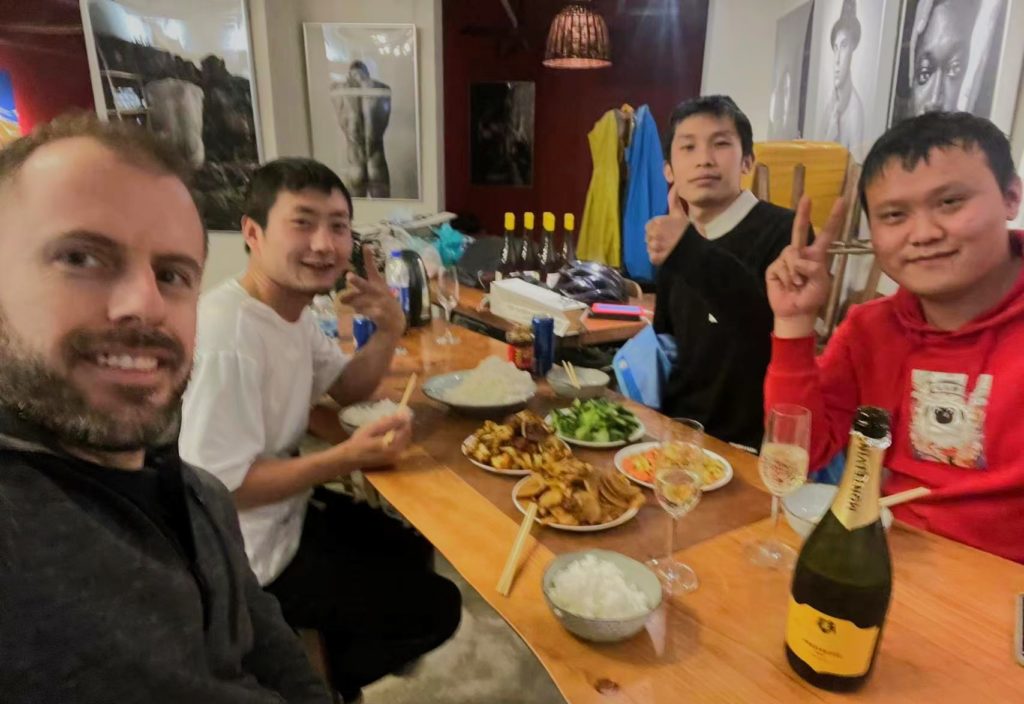
Larrain would leave his apartment and join his new roommates two days later. That required signing a paper to guarantee he would not return to his apartment complex until after the COVID policy changed. There was no turning back.
When he arrived at his shop, with pillow and air fryer in hand, he found a mess, but an expected one.
“We opened our mini app for delivery and the orders boomed. We were one of the few wine suppliers able to deliver in the Puxi area for some weeks. We got 100 orders the first day [while I was still in my apartment],” he says.
“The guys started to use random wines for the orders, and it took a lot of time to organize all the orders to begin with, so we were behind.”
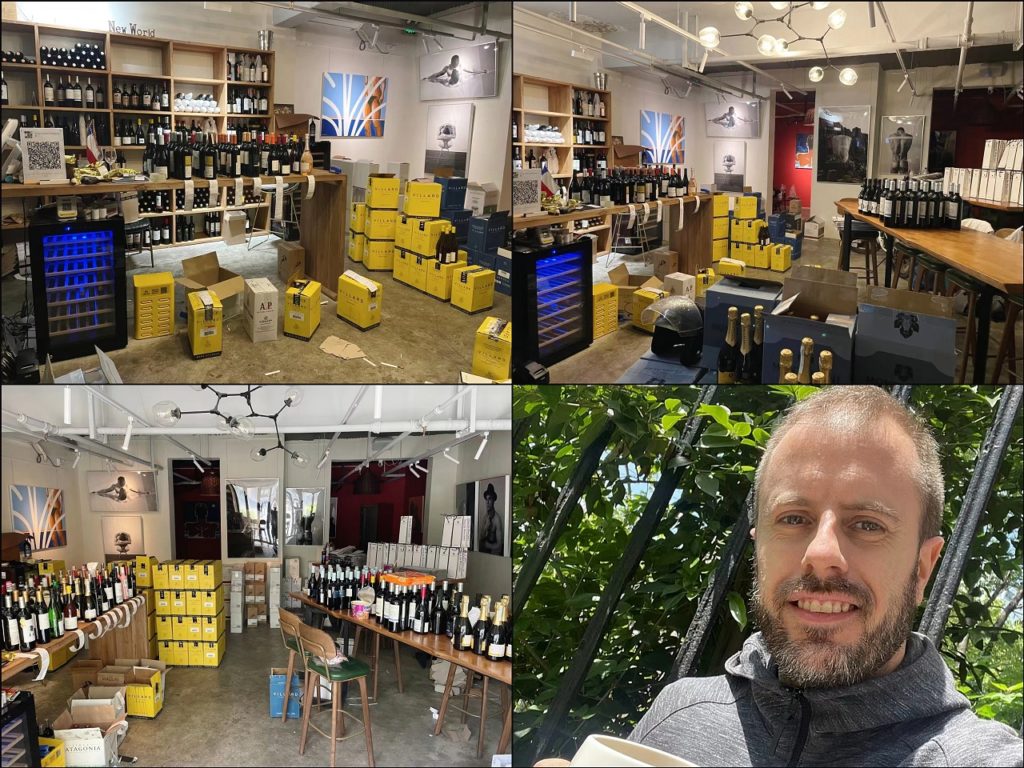
But it wasn’t anything that a few 16-hour days couldn’t fix.
“For the first five days, I usually worked from 7 AM to 11 PM. It was insane. There was one day that we got 150 orders,” he says.
“Since I was the guy who knew the wines, I had to arrange everything in the shop, which basically became a warehouse, and Xiao Liang was also checking.”
And the learning curve for the drivers was steep.
“The boss of the delivery guys, Xiao Xu, was very smart. It’s not easy to distinguish between a Cabernet Franc and Cabernet Sauvignon for someone with no wine experience, but he did things quite well for a newcomer.”
Five days after Larrain handed over the keys—or, rather, tossed them to a stranger through Shanghai’s spring air—and three days after moving into the shop, he posted on WeChat:
“My compound allows us to leave but we can’t return so I moved into my shop so I could do deliveries. What a crazy couple of days I had! We delivered 400+ orders in five days. It was overwhelming. But happy to help in these crazy times! Wine is essential for some people.”
He also had a stroke of luck in those first hectic weeks: the arrival of a container of his wines from Chile.
“We sold out fast but luckily a container of my wine reached Shanghai during the lockdown and I found an open warehouse to use.”
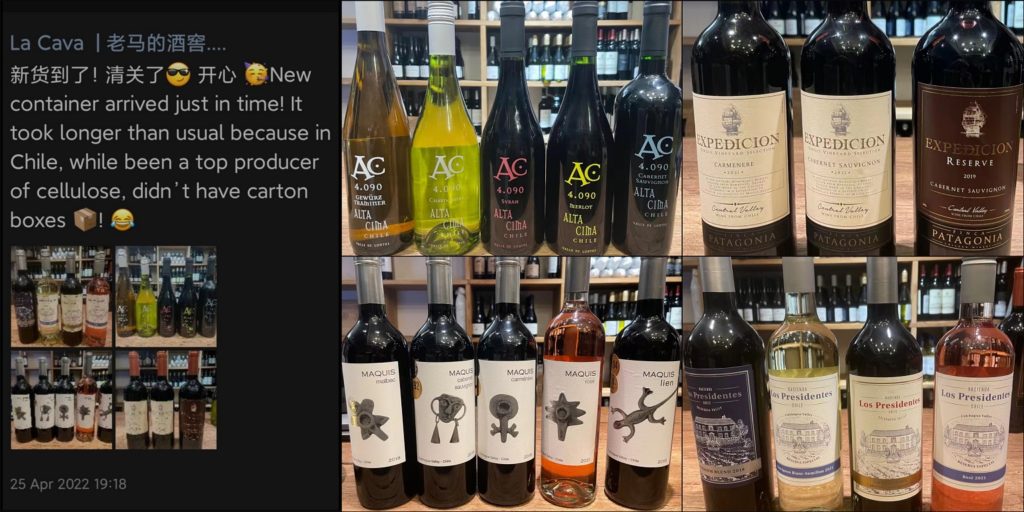
Daily Life
After the first few weeks, things calmed down a bit, and routines formed.
“I was sleeping on the sofa and they were sleeping on makeshift mattresses they made out of cardboard, a much better situation than sleeping outside like a lot of delivery guys, who were living under bridges.”
“Basically, I was the first to wake up, at 9 AM, as they were late-night guys—night owls—checking videos on TikTok,” says Larrain. “I did bring coffee with me and I made it Turkish style, very strong.”
“For bathing, I did it the Japanese way, where you wash one body part at a time. For me, a daily shower is a necessity, or I can’t truly wake up.”
“Our shop also had a terrace, so I was able to get sun when the weather was good,” he adds. “After the lockdown, I had people from the building next door say they saw me half-naked during those days!”
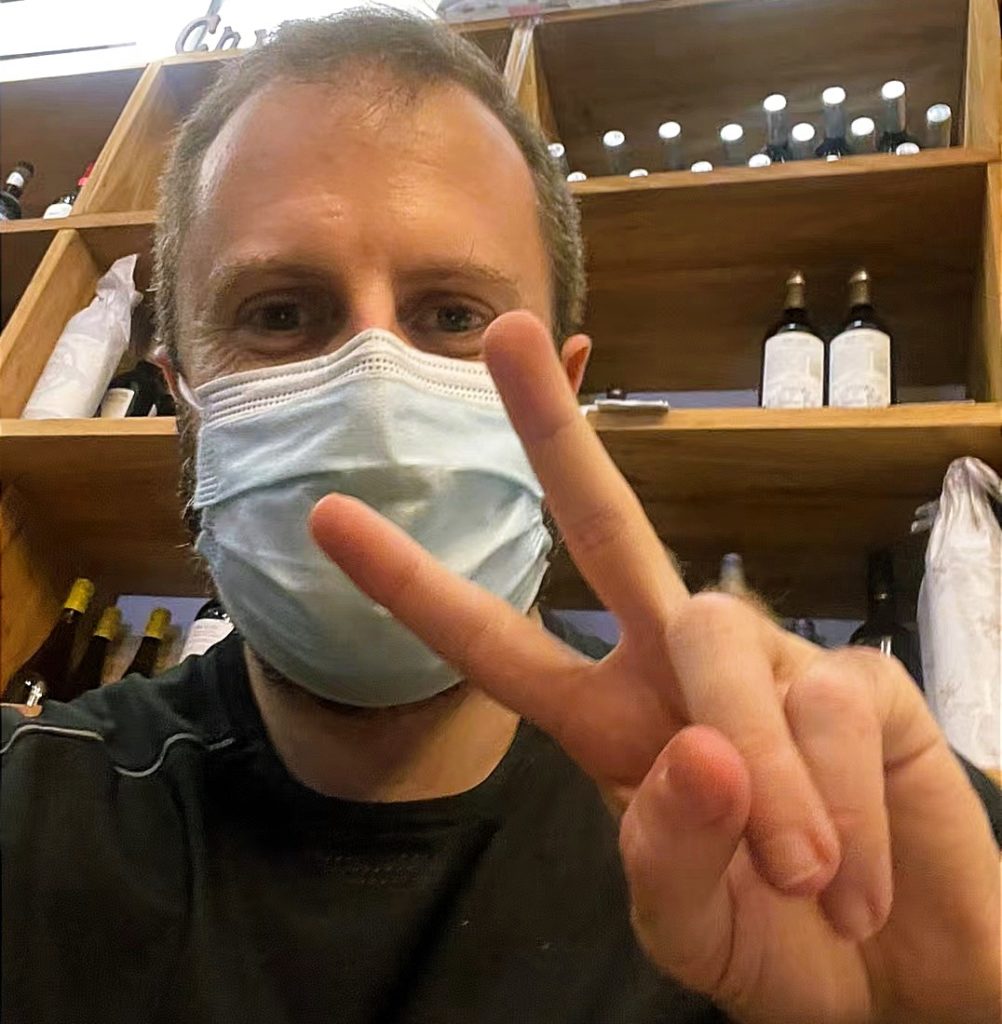
Safety First
Being free from his apartment didn’t mean freedom of movement, says Larrain, as many regulations still applied, and there were plenty of police and barricades to enforce them.
“Not everyone could move around the city those days. Only people with certain permits and under certain conditions,” he explains.
“The delivery guys were allowed to circulate, but most were living in the streets because it was impossible to come in and out of apartment complexes,” he says, adding that drivers needed to use an app showing their health code status and daily COVID test results.
“We needed to follow a lot of health protocols and take care of each other,” he says. “We needed to limit ourselves to the deliveries. The idea was to avoid contact with people from outside our circle.”
Despite all of these rules, delivery could be very lucrative.
“At the beginning, these guys were very busy and earning a lot of money,” says Larrain.
“People were desperate for deliveries and willing to pay high fees. For some people, one delivery could cost RMB400, so the drivers made a lot that first month.”
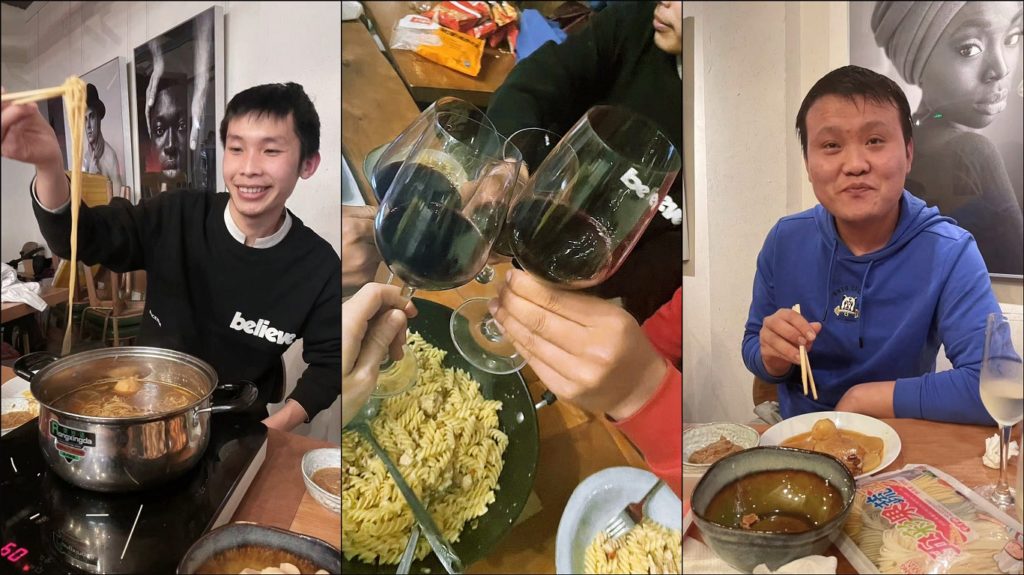
On Eating
“The guys usually went out at around 11 AM and came back depending on how many orders they got. Shanghai is so big and you can only carry five or six orders maximum, and then you need to go back to the shop for more.”
“We normally had dinner together. They mostly ate noodles–morning, noon and night,” he says. “I was worried about nutrition. We had to have more vegetables and stuff, but they always said the prices were too high.”
“They always complained that potatoes, for instance, were too expensive those days. I told them ‘I need my potatoes, I need my carrots, I need my apples, the price doesn’t matter’.”
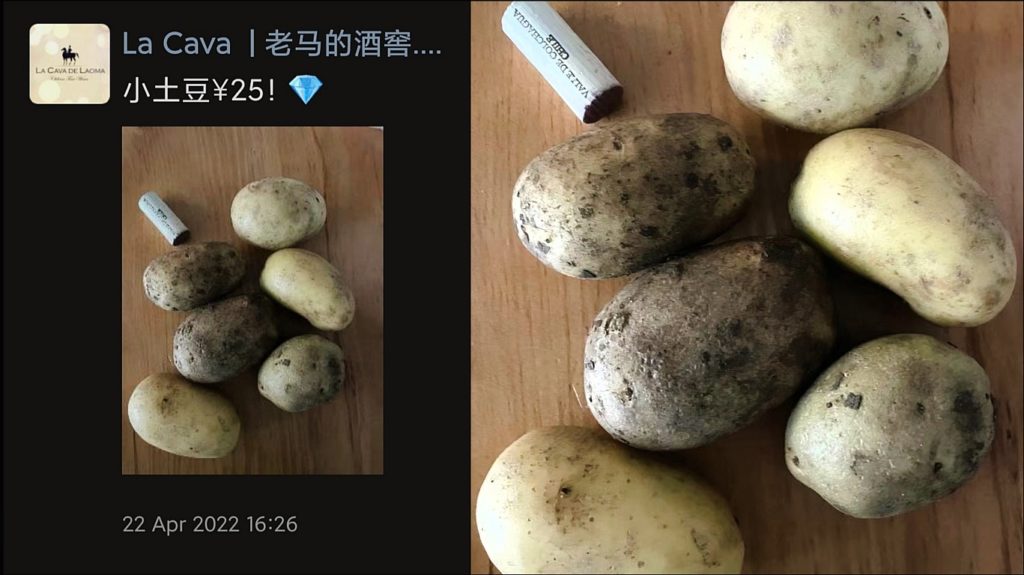
“I paid for those and one of the guys cooked pretty well. I also used wraps to make pizzas in the air fryer and they were incredible. At that time, the shop offered cheese and Spanish ham in the shop I could use,” he explains.
Food was prized. He raved in a WeChat post about how much better a Dove chocolate bar tasted during this time of “zero-COVID” policy.
“I also remember my first piece of meat, on a Sunday, at Easter. I exchanged a whole uncooked duck for Chilean wine with a friend and cooked it in my air fryer,” he says.
“Sunday night was when we relaxed just like back at home. Normally they didn’t drink alcohol, but one guy would on Sunday nights with me. I think it was because I asked him to drink because I don’t like to drink by myself.”
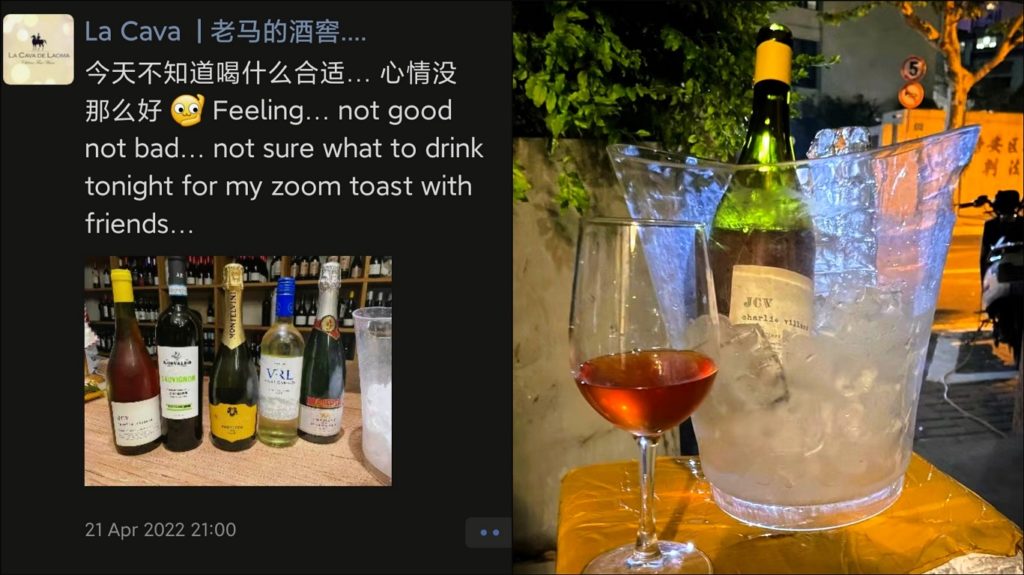
On Connecting
“I kept in touch with people online,” says Larrain. “I had Zoom meetings with friends, and with customers, drinking online. It was fun in that sense.”
“I was busy. And I was lucky because I was busy. And I was also lucky to be with fellow humans.”
“We had one notable event, during lockdown, an online wine tasting I organized,” he says. “We had 45 people join! They were so attentive, it was the first thing they had to do in weeks. Then after the presentation of our Maquis wines, by my cousin in Chile, people kept talking and drinking online until 1 AM.”
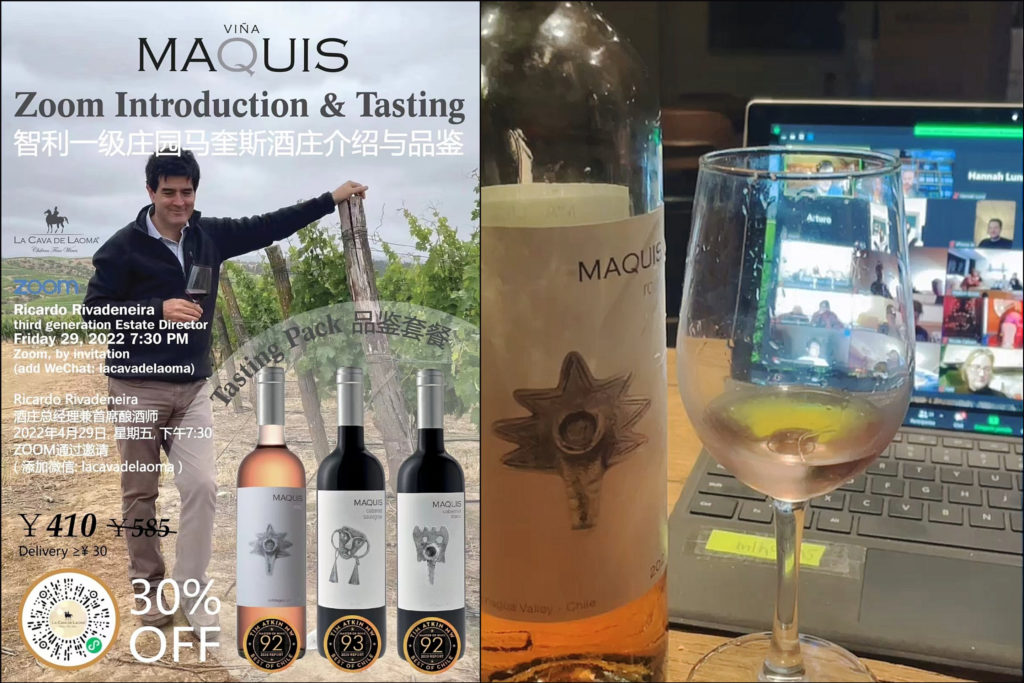
The Aftermath
“We did much better after the lockdown. We met a lot of people who became loyal customers and were very happy with our wines and promotions,” says Larrain.
“Of course, after the lockdown, people had many more options. And I estimate that at least half of our customers have since left China, a process that is still continuing,” he adds.
“Still, when I go to wine fairs and people see our brand, a lot of them approach me and say, ‘I bought wine from you. You are our hero because during lockdown you really helped us.’ That happens all the time.”
In hindsight, Larrain says living in his shop was the right move.
“We faced many challenges, especially to find food to feed four hungry men,” he says. “But I couldn’t be more grateful for my decision. Not only did my business thrive, but I had the chance to live with fellow humans and to take care of each other like a family under very special circumstances. Maybe I became a bit crazy due to the lockdown, but a few months after it ended, I felt that I began to heal.”
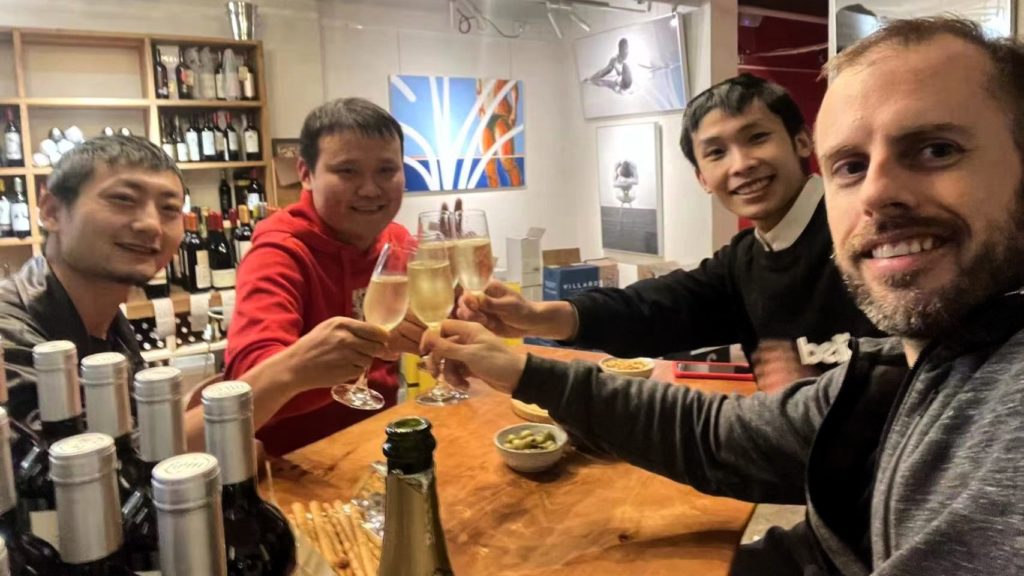
La Cava de Laoma celebrates its tenth anniversary this week. Check out this poster for details. Also see my Q&8 last week with Larrain about China’s wine market, this Q&8 in 2022 before the Shanghai lockdown, and, going way back, this 2014 interview when he was based in Beijing.
Sign up for the Grape Wall newsletter here. Follow Grape Wall on LinkedIn, Instagram, Facebook and Twitter. And see my sibling sites World Marselan Day, World Baijiu Day and Beijing Boyce. Grape Wall has no advertisers, so if you find the content useful, please help cover the costs via PayPal, WeChat or Alipay. Contact Grape Wall via grapewallofchina (at) gmail.com.
Leave a Reply
You must be logged in to post a comment.